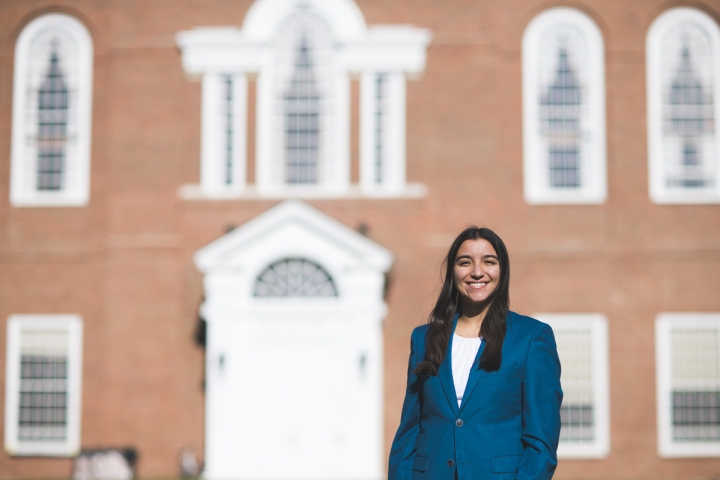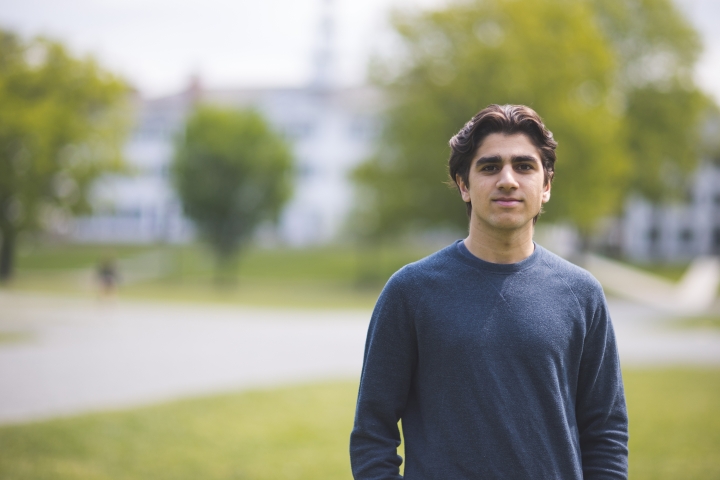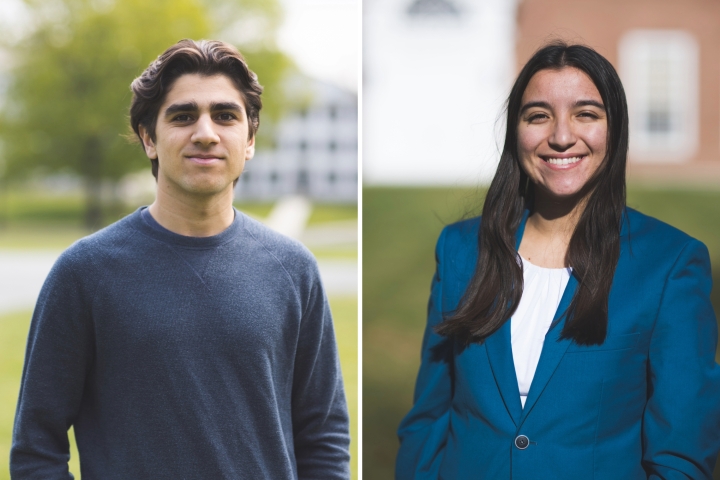Jessica Chiriboga ’24 and Zachary Lang ’23 have been named Rhodes Scholars—bringing to 81 the number of Dartmouth students to win the prestigious award since it was established 121 years ago.
The two join a cohort of more than 100 top students from around the world—including 32 Americans—who will pursue graduate studies at the University of Oxford next year.
“It is a joy to congratulate Jess and Zach on this profound achievement, which reflects not only their outstanding academic accomplishments but their outsized commitment to making Dartmouth a better place to live and learn for everyone,” says President Sian Leah Beilock. “In their time in Hanover, Jess has brought student voices to the table around critical institutional decisions, including advancing mental health and wellness on campus, and Zach dedicated himself to preventing sexual violence and promoting restorative justice. I know they both will bring their intellectual curiosity and passion for serving others to Oxford and beyond.”
The Rhodes Scholarship is the oldest and among the most celebrated international graduate scholarships in the world. Past Rhodes Scholars have gone on to become heads of state, Nobel laureates, Pulitzer Prize winners, leaders of colleges and universities, and Supreme Court justices.
Dartmouth has previously produced a total of 79 Rhodes Scholars, most recently Sarah Waltcher ’16.

Jessica Chiriboga ’24
A history major and government minor from Glendora, Calif., Chiriboga plans to use the Rhodes to pursue an MPhil degree in history at Oxford, where she will study Latino environmentalism and outdoor recreation in the San Gabriel mountains around Los Angeles from the early 20th century to the present day.
“I am deeply honored and grateful to join the Rhodes Scholar community,” says Chiriboga, who plans a career in history or law. “This will be my first time studying abroad, so I look forward to meeting people from across the world and learning more about different cultures. I hope the Rhodes Scholarship will broaden my understanding of our biggest environmental and political challenges and nurture my growth as a leader. I also look forward to backpacking and climbing in the United Kingdom and hopefully organizing events in the Rhodes House. I might even try my hand at playing rugby.”
Chiriboga currently serves as student body president of Dartmouth Student Government, where she has been active throughout her time at Dartmouth. As president and, formerly, vice president, she has helped represent student interests at all levels, serving as undergraduate student liaison to the Board of Trustees and as a student member of numerous administrative committees and working groups.
In particular, she has been deeply involved in advocating for student mental health, serving as Mental Health Committee co-chair and representing undergraduates on the Dartmouth-JED Foundation steering committee.
“I am passionate about creating spaces that are better fit for the people in them and working to improve mental health resources and policies and other student life issues for undergraduates on campus,” she says. “I am eager to use what I have learned—as a student leader, outdoorswoman, and student of history and government—to advance justice in the United States and beyond.”
Chiriboga used a Stamps Scholarship to study the environmental history of Mexican people in California, research that contributed to her thesis research, which earned the Louis Morton Memorial Prize in American History from the Department of History.
“I have known brilliant students in my three decades as a professor, but none who exhibited the capacity to do original work at such an early stage in her education as Jess Chiriboga,” says Matthew Garcia, the Ralph and Richard Lazarus Professor of History, Latin American, Latino, and Caribbean Studies, and Human Relations. “Her intellectual curiosity is without peer, and her joy for research is endless. She deserves this honor more than anyone I have known.”
Outside of the classroom, Chiriboga is president of the Dartmouth Political Union; a senior leadership fellow at the Rockefeller Center for Public Policy, where she was a first-year fellow and an outreach and engagement intern at the Washington, D.C.-based Americans United for Separation of Church and State. She is also vice president of the LGBTQ student organization Within; editor for the Dartmouth Undergraduate Historical Review; and associate editor for the Dartmouth Law Journal.
Previously she was a Great Issues Scholar through the John Sloan Dickey Center for International Understanding, and a law and ethics fellow at the Ethics Institute. She represented Dartmouth at a 2022 student forum on reproductive freedom hosted by Vice President Kamala Harris at the White House.
Chiriboga has been a trip leader for the Dartmouth Outing Club, for which she helped develop a 2022 conference on equity and inclusion in the outdoors. Among other outdoor adventures, she completed a 150-mile solo backpacking trip up the summit of Mt. Whitney and co-led a weeklong backpacking trip to Death Valley.
As a podcaster for the award-winning history podcast Untextbooked, Chiriboga produced episodes on how democracies fail, the history of Brazilian biofuel, and the U.S. role in the coup that brought Augusto Pinochet to power in Chile. She also served as a legal intern for New Hampshire Chief Justice Gordon MacDonald ’83.
“The Dartmouth community has helped me grow in ways I never could have imagined as a first-year student,” says Chiriboga, who is a quadruplet. “I would like to thank my faculty and extracurricular mentors, the Fellowship Advising Office, my friends, and most importantly, my parents and three brothers for their endless support and encouragement.”

Zachary Lang ’23
Lang, who double-majored in history and philosophy at Dartmouth, is currently on a Fulbright Program award in Belgium, where he is teaching academic English to undergraduates and graduate students at Hasselt University.
He plans to use the Rhodes Scholarship to pursue a BPhil degree—a stepping stone to a doctoral program, and, ultimately, his dream of an academic career in philosophy.
“Oxford has a very strong philosophy department and several institutes doing innovative work on philosophical issues that I’m interested in, such as epistemology,” says Lang of his decision to pursue a Rhodes.
Equally important to him is the community of peers that Rhodes brings together. “My thinking has benefited a lot from talking with similarly minded, motivated peers, and I view the Rhodes community as an extension of that—students who are academically and practically interested in advancing social issues coming together and working collaboratively across disciplines.”
Lang says he has always been interested in philosophy, but it wasn’t until Dartmouth that he was able to study it formally, first in an introductory course taught by Professor David Plunkett—with whom he later worked as a James O. Freedman Presidential Scholar—then in a course on feminist philosophy taught by philosophy professor Susan Brison.
“David Plunkett had us read Thinking It Through by Kwame Anthony Appiah, which looks at a range of philosophical issues and condenses them with really fantastic explanations. Through that exposure, it became clear to me that this is what I want to do—namely, to sit down and wrestle with burning questions and see what kind of progress I can make on them, both theoretically, but then also to try to translate that intellectual labor into practical solutions,” he says. “And I was not only interested in philosophy as an intrinsic matter, but also because it was helpful for the kind of sexual violence prevention work that I was engaged in.”
That work includes serving as a member of the student advisory board for the Sexual Violence Prevention Project and as executive policy chair of the Student and Presidential Committee on Sexual Assault, through which he worked to expand restorative justice pathways for survivors.
“In my feminist philosophy class, we learned about theories that are rethinking punitive legal systems so that we can more effectively support not only survivors who want perpetrators to take responsibility, but also perpetrators who want to be reintegrated into the community. As I was working with my peers in the SPCSA, being able to take a critical step back and evaluate these questions carefully, rigorously, and methodically with the tools of philosophy was super helpful,” Lang says.
Lang’s senior honors thesis, for which Plunkett was his adviser, won the Story Prize, the philosophy department’s top honor.
“Zach exhibits all the qualities a Rhodes Scholar should have—exceptional scholastic achievements, courage, compassion, and unfaltering energy and determination to use his talents to help others and to bring about a more just world,” says Brison, the Susan and James Wright Professor of Computation and Just Communities. “He is also one of the kindest and most caring students I’ve known.”
Among other Dartmouth activities, Lang served as deputy editor of Memento: Journal of the Critical Humanities, and as senior editor of the Dartmouth Law Journal. He previously interned with Seamans Capital Management and Bain & Company, and was a legislative intern for U.S. Sen. Jeanne Shaheen.
For information about applying for Rhodes and other scholarship programs, visit Dartmouth’s Fellowship Advising Office.
